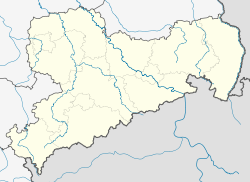 The station building | |||||
| General information | |||||
| Location | Am Bahnhof 1, Zwickau, Saxony Germany | ||||
| Coordinates | 50°42′54″N12°28′37″E / 50.71500°N 12.47694°E | ||||
| Line(s) |
| ||||
| Platforms | 8 | ||||
| Construction | |||||
| Accessible | Yes | ||||
| Architect | Otto Falk (1933) | ||||
| Other information | |||||
| Station code | 7068 [1] | ||||
| DS100 code | DZW [2] | ||||
| IBNR | 8010397 | ||||
| Category | 3 [1] | ||||
| Fare zone | VMS: 16 [3] | ||||
| Website | www.bahnhof.de | ||||
| History | |||||
| Opened | 18 September 1845 | ||||
| |||||

Zwickau Hauptbahnhof is the main railway station of Zwickau in the German state of Saxony.


